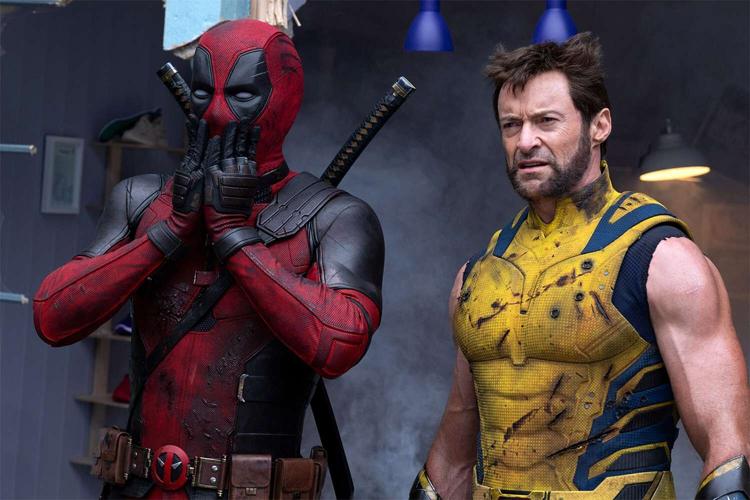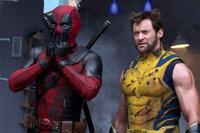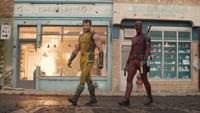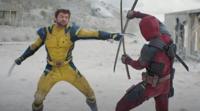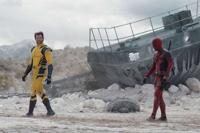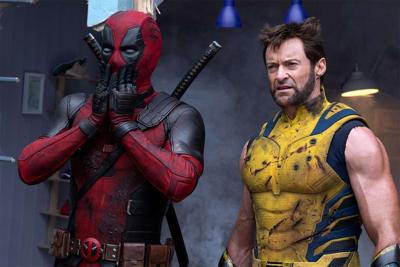Hugh Jackman first starred as the character of Wolverine in X-Men (2000). It was produced by 20th Century Fox. It kicked off a franchise that resulted in 13 major motion pictures. Ryan Reynolds appeared in the fourth entry of that franchise as the character of Wade Wilson aka Deadpool in X-Men Origins: Wolverine (2009). Sadly, of all the sequels in the X-Men franchise, that 2009 entry was the worst performing both critically and financially. Reynolds clearly loves super-hero films. He followed up his role 15 years ago with another super-hero film, that of Green Lantern (2011). That film was also not well received critically and financially. When the 8th entry in the X-Men franchise came along, that of Deadpool (2016), and Reynolds was able to resurrect his 2009 character, he used it to mock or make fun of his career, as well as other super-hero films, and it was a success. Of course, he continues that same dynamic here.
The X-Men characters were part of Marvel Comics, but Marvel Comics sold the rights to those characters to 20th Century Fox. Marvel Comics sold its Spider-Man characters to Sony Pictures. All the other characters, known as the Avengers, were sold to the Walt Disney Company. Disney started making films of those Avengers characters, beginning with Iron Man (2008), continuing with Thor (2011), Captain America: The First Avenger (2011), Ant-Man (2015) and Doctor Strange (2016). The Disney films came to be known as the Marvel Cinematic Universe or MCU. Even though the comics had crossovers between Avengers and X-Men characters. The MCU only had Avengers in it and excluded X-Men characters.

In 2019, Disney completed its purchase of 20th Century Fox. Until that point, Disney hadn't allowed any MCU film to be rated R. This is the first MCU film to be rated such. All it means though is a lot of violence, especially a lot of gratuitous violence, which is typical for Deadpool and its sequel Deadpool 2 (2018). The opening sequence here does contain a lot of blood and gore. This film, directed by Shawn Levy (Free Guy and Stranger Things), does temper things by having that blood and gore put upon a lot of faceless characters or characters who wear helmets or masks. Yet, there is one notable decapitation that happens to someone without a helmet or mask, which is probably the only one Disney would allow. Other than that, the violence here is very cartoon-like, which can be fine, but this film underscores the fact that its two protagonists are immortal. No matter the violence done to them, they can never die, which takes away all stakes and thus renders much of the action repetitive and boring.
Other than his ability to regenerate and not die, the character of Deadpool is also known for breaking the fourth wall and being a meta-character, meaning he's a character who talks directly to the audience and comments on the fact that he's in a movie. That aspect continues here and is in many ways amplified where he's constantly making cracks or jokes about the fact that his franchise is now owned by Disney, a company known for content aimed at children or people who perhaps shouldn't be allowed to see something R-rated like this. This mainly includes a lot of F-bombs and a lot of sexual references, including homosexual references. Top of the list are a ton of butt gags. These references are just jokes, which is also another issue.

Here, Deadpool notes that one restriction from Disney for this film is not depicting the use of cocaine on screen. The fact that he makes so many references to cocaine would seem to suggest that he's being defiant or subversive of that restriction as best he can. It's meant to underline his boldness or his ability to say or do anything. Cocaine or drug-use becomes the elephant in the room that Deadpool calls out, but in only reinforces the fact that this film is all talk when it comes to certain things but isn't as boundary pushing as it would suggest. One can argue that all of his gay jokes or butt gags, as it were, is him calling out the other elephant in the room, but if there were an edict that Deadpool can't express his or anyone else's homosexuality, then that edict was followed really without any push-back.
In March 2022, Governor Ron DeSantis of Florida signed into law the Parental Rights in Education Act, or what was nicknamed the "Don't Say Gay" bill. It banned public schools from any discussion of sexual orientation or gender identity. Because Disney has a theme park and also does a lot of other business in Florida, LGBTQ people within the company pressured the then CEO to do something about it. The CEO ostensibly did, which caused Governor DeSantis to retaliate, starting with revoking the special district status that gave Disney autonomy over its theme park, as well as other actions. In April 2023, Disney filed a lawsuit against the Governor. It was the case of Disney v. DeSantis. The state of Florida counter-sued and thus began a legal war that has probably been one of the most monumental things to happen to the company since its inception, and it all stemmed from LGBTQ issues.

Reportedly, this film began principal photography the following month in May 2023. Given how smart and how in touch with pop culture as Ryan Reynolds is, it's shocking that he would not comment upon this in the film. It's odd he would not do something declarative about this monumental incident. One of the complaints has been that Disney, even over the past decade, has done a poor job of depicting LGBTQ characters. In 2013, it was confirmed that Deadpool is pansexual, meaning he can be attracted to men and women and anything in between. He's essentially part of the LGBTQ community. Yes, there are references to this fact, but, at no point do the films actually depict same-sex relations or that pansexuality with anyone other than the woman, Vanessa, played by Morena Baccarin, from the 2016 film, with whom he broke up.
If there were ever a chance for this franchise to depict Deadpool expressing his pansexuality and possibly falling in love and having sexual relations with a man, this film was the perfect opportunity to do so. Yet, Levy and Reynolds opt for a bloody buddy cop film, rather than a raunchy sex farce where instead of penetrating each other with knives, Deadpool and Wolverine could have penetrated each other with other parts of their bodies in acts of love and attraction, not rage. With all of this film's boldness, it like most mainstream films is still cowardly about being gay and actually showing it. This isn't a surprise though, as most super-hero films, particularly those in the MCU, refuse to show any sexuality. The only exception is Eternals (2021). Prior to that, the only time I remember any kind of sexuality in a super-hero film was Superman II (1980). Deadpool 2 did have a lesbian couple, but here under the banner of Disney, you'd never know it.

Most comic book fans will probably enjoy the endless amount of cameos, including cameos from super-hero films going back to the 90's. Spider-Man: No Way Home (2021) got that ball rolling. Reynolds and crew are merely picking it up here. Long time fans might also get a kick out of the gimmick of redeeming actors who always wanted to be in a super-hero film but never got the chance. Doctor Strange in the Multiverse of Madness (2022) similarly got that ball rolling. This one is merely copying the formula. For those sick of those multiverse tricks that play on nostalgia or wish-casting, this one seems to put a button on it, or it could be the sign of times to come.
Rated R for strong bloody violence, gore, language and sexual references.
Running Time: 2 hrs. and 7 mins.
In theaters.


